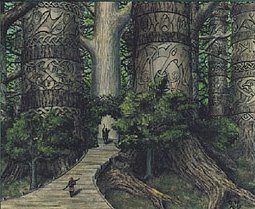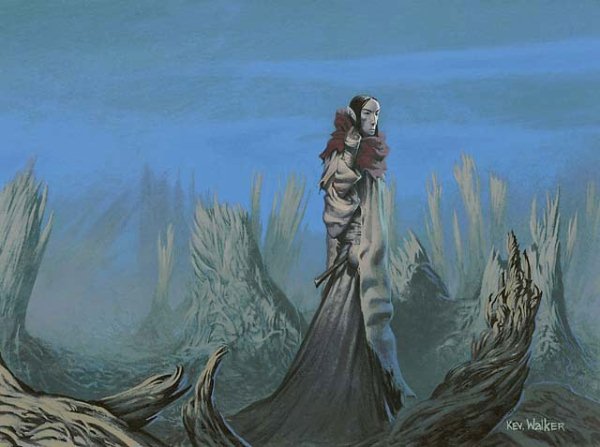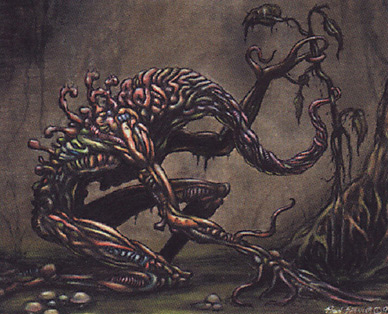You hurry to the old man’s room after sunset, excited to hear the remaining pieces of his recent story. The nights since the old man first told you of the fallen empires have been filled with dreams of thrulls and merfolk, and you desire more details to enrich your dreams.
Your feet move quickly, leaving the stone and rug beneath them just enough to give the image of a water strider scooting across the surface of a pond to anyone you may pass in the hall. With this pace, you reach Issar Roon’s study faster than on any previous visit. Immediately upon arriving, you open the oak door before the old man has a chance to answer your knock.
I see you are anxious to visit this old bag of bones. It would not have anything to do with my previous tale, eh? I suppose it is expected. I did leave your mind with an unfinished tale, and that is a dangerous thing to do to one as young as you. Very well, I will help soothe your restless imagination.
The old man nods to your usual spot upon his rug and turns back to his book, pen in hand. When he is done with his writing, the old man begins his story.
The dwarves living high in the Crimson Peaks were another nation that fell to outside forces, much like the Vodalian merfolk. Sadly, their name has been lost to the tides of war. It is unlikely that we will ever find record of anything beyond their demise.
What is known is that they lived peacefully with the other Sarpadian nations, trading their steel to Icatia and the Order of the Ebon Hand in return for materials and food not found in the mountains. They rarely left their strongholds otherwise, preferring to keep to themselves.
 The dwarves’ end came at the hands of a force of goblins and orcs. Though they had been fighting off raids from the two other races of the Crimson Peaks for generations, it was a sudden alliance of the two that overwhelmed the well-equipped dwarves. Each bastion fell, and before the dwarves could properly assess the danger, they found themselves hiding in a mine, low on resources and closed off from escape. Their last message was a plea to the elves of Havenwood, asking them to chronicle dwarven history on Sarpadia.
The dwarves’ end came at the hands of a force of goblins and orcs. Though they had been fighting off raids from the two other races of the Crimson Peaks for generations, it was a sudden alliance of the two that overwhelmed the well-equipped dwarves. Each bastion fell, and before the dwarves could properly assess the danger, they found themselves hiding in a mine, low on resources and closed off from escape. Their last message was a plea to the elves of Havenwood, asking them to chronicle dwarven history on Sarpadia.
The old man’s tone is soft, a strange attribute for his usually gruff and raspy voice.
The dwarves’ final request went unfulfilled—though they did not live long enough to know it. The force of goblins and orcs wiped out all of the remaining dwarves, and then moved on to the lowlands. As for the elves, they had their own troubles and could not carry out the dwarves’ desire, whether they wished to or not. The elves were in the midst of following the Ebon Hand down the path of self-destruction.
When the Ice Age came to Sarpadia, the merfolk in the sea were not the only ones affected. The fields of Icatia began to dry up and wither, as did the food sources of the elves. Some historians have even suggested that this was the reason for the goblins and orcs leaving their high caves in the Crimson Peaks, forcing them to find resources in the lower lands. The elves were hit the hardest, and were forced to watch their forest rot and die in the cold air.
What happened to the elves is well documented, much like the demise of the Ebon Hand, and followed a very similar path. In fact, there have been a few claims discovered in recovered documents that the elves stole the Ebon Hand’s techniques, but that is a debate best left to those who care for the details of history. The important matter is that they created their own version of thrulls thanks to an elven druid named Thelon.

With his nation starving and on the cusp of death, Thelon desperately searched for a solution. He had noticed that the moss and fungi of the forest were thriving, while almost all other life was struggling to stay alive, and determined that the fungus of the woods would be Havenwood’s salvation. Whether he discovered this on his own or stole the ideas of the Ebon Hand, no one shall ever know, but Thelon’s results were disturbingly similar.
 After careful research and experimentation Thelon developed a technique of infusing fungus with green mana and cultivating it into creatures he called thallids. These thallids were treated like cattle, as what they produced was all that mattered to the elves—a food source the elves called saprolings. While the thallids held a basic intelligence and awareness, saprolings were simple plantlike creatures that did little beyond reproducing. Perhaps one could compare them to the amoeba on your world.
After careful research and experimentation Thelon developed a technique of infusing fungus with green mana and cultivating it into creatures he called thallids. These thallids were treated like cattle, as what they produced was all that mattered to the elves—a food source the elves called saprolings. While the thallids held a basic intelligence and awareness, saprolings were simple plantlike creatures that did little beyond reproducing. Perhaps one could compare them to the amoeba on your world.
When the old man sees your blank expression, he waves his hand and continues.
The saprolings were perfect for the elves’ predicament. They were created by a creature that thrived in the new, colder environment, and could reproduce more quickly than the elves could harvest them. The elves rejoiced, and Thelon became idolized by many. In fact, the ones closest to his practices became known as Thelonites—monks and druids who devised new purposes for the saprolings beyond being a simple food source.
Of course, nothing in life is that simple, and the creation of thallids did not bring about a period of prosperity for the elves. Instead, it divided them. As the thallids quickly gained intelligence, many of the elves believed they should be treated with more dignity and respect than mere cattle. An argument raged for weeks, and eventually the elven king ordered a solution. Loren, a master scout and member of the king’s council, was given the task of tracking the thallids and determining whether their evolution was one of sentience.
While Loren found the claims of thallid sentience to be correct, he was never able to report such facts. Morgan, another member of the king’s council, feared the thallids, and hoped to sway public opinion against them. To this end, he killed the master scout before reporting to the king that the thallids had attacked and consumed him. As fate would have it, Morgan failed as well, and his actions only served to speed up the destruction of his nation.
Loren’s death did nothing but throw fuel on the fire between each side of the thallid debate. In the end, the elves went to war against themselves, and the thallids thrived on the leftovers. What elves that remained when the warring sides finally acknowledged a tentative peace were overrun by their own creations. Thus, the elves fell just like the Order of the Ebon Hand.
The old man pauses for a moment, and then starts as if waking from a short nap.
My, but it has grown late! I suppose that is enough of a tale for today.
Icatia? There is not much to tell of the white-aligned nation on Sarpadia sadly. I could describe the soaring ramparts or massive trading towns, but in the end, it was all destroyed by the forces that brought down the other cultures on Sarpadia. The poor Icatians, so well protected that they were immune to the other nations’ difficulties until those difficulties all converged upon them.
I suppose it is a history lesson on how to treat your neighbors, but I do not believe in imparting moral stories upon you. Instead, I hope you have learned more about Dominaria, and are better equipped to handle what is to come in your future.
You find yourself slightly disturbed by the old man’s words about your future, but his eccentricities are nothing new. Ignoring them, you leave the soft rug and take your leave, hoping the old man will have a new story for you upon your next visit.























